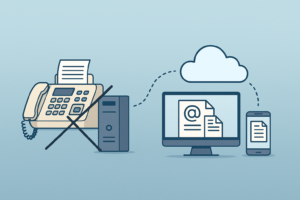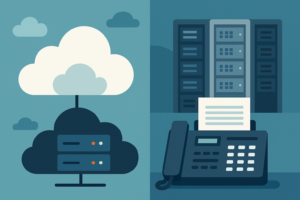The molding of young minds is an absolutely crucial part of ensuring the success of future generations. Education has time and again been found to be at the root of societal progress, but more recent challenges have begun to stand in the way of this process. One of these is the transfer of important student-related documents between institutions.
Schools are given a treasure trove of information regarding the lives of their pupils, and yet the movement of this data is very often done in an inefficient and ineffective way. One solution to these data-transfer woes is Fax over IP, a major development that is shifting the face of modern facsimile technology. This technology has the ability to send and receive secure faxes using an internet connection, which has some wide-reaching effects for teachers and administrative staff within schools.
To that end, what specific fax benefits can those within the educational field receive from FoIP?
FERPA compliance is vital
Data security is obviously a huge priority in every sector, but this is especially true of the information concerning younger students currently receiving their primary or secondary education. Schools need to collect a large amount of data about each of the children attending their institution in order to properly educate them, while remaining FERPA compliant. What’s more, this information often needs to be transferred for a wide variety of reasons.
“Educational documents very often have personally identifiable information in them.”
The problem here is that educational documents very often have personally identifiable information in them. This could be something as benign as the child’s name or as serious as their home address. Therefore, the security of this data is absolutely essential to protect the identity and safety of each student.
This necessity to ensure privacy was the driving factor behind the creation of the Family Educational Rights and Privacy Act. This regulatory standard ensures that PII contained within educational documents cannot be given to anyone aside from the child or his or her legal guardians unless the institution is given written consent. Basically, if a school allows for data to be intercepted in transit, it would be in violation of FERPA.
This is why the transfer of student information via an unsecured platform such as email is simply out of the question. There are too many opportunities for hackers to gain access to private data. FoIP, however, is widely regarded as an incredibly secure means of communication. Schools utilizing a fax-over-IP solution can rest assured that the information of their students won’t fall into the hands of nefarious cybercriminals.
Nothing archives like FoIP
Although FoIP is one of the most secure ways to transfer important documents, it’s also true that legacy fax systems work well at keeping data out of the hands of hackers. That said, security is just about the only benefit that fax machines have. These devices are extremely inefficient for multiple reasons, but none of these disadvantages are more troublesome than the amount of time employees waste rummaging through paper archives.
According to the National Center for Education Statistics, there were more than 50 million students enrolled in the fall 2015 school year. That’s a huge number of children to keep track of, and it’s not surprising that many schools struggle to ensure the information of every student is properly stored.
 Improved student information storage is a major benefit of FoIP
Improved student information storage is a major benefit of FoIPWhile legacy fax systems are certainly going to help make sure the data of these students stays secure, this technology’s reliance on paper means that school employees will have to keep physical records on-site for every single student. Not only is this an incredibly inefficient means of data storage, it also creates a major vulnerability for these documents. Something as simple as a fire can instantly destroy a vast swath of student information, forcing administrators to scramble in order to recreate everything that was lost.
FoIP, on the other hand, completely avoids this problem by storing any incoming fax sent through the system. This allows the administrative staff to utilize a searchable archive when looking for a student’s information, rather than digging through a massive stack of paper files. On top of that, FaxCore’s FoIP solution is conducted through the cloud, which means this data is physically separated in our cloud fax services from the school, and is therefore safe from any disaster that may damage the facility.
No one else has to change anything
A major problem facing America’s educational system is an inequality of wealth. Some educational districts have a lot of tax money and rich parents to draw resources from, while others simply have to make do with what they have. The solution to this varies depending on who you ask, but the point here is that many schools simply can’t afford to upgrade some of their systems.
The problem with this is that schools need to communicate with each other. One district may have the money to better its communications structure, while another in the neighboring town may just be scraping by. Certain forms of digital document transfer therefore complicate this issue even further, as they require each school to use the same equipment or software.
This simply isn’t a concern when it comes to FoIP and cloud fax services. Any school currently using a legacy fax solution to solve its document transfer woes can communicate with a district that utilizes FoIP, without even having to upgrade or download any extra software. FoIP is designed to be easy to use, both for the person sending the message and for the person receiving it.
Enhance enterprise communication, collaboration and compliance efforts with a proven FoIP and cloud fax service from FaxCore. Request a quote from FaxCore today to learn more about their ‘Partly-Cloudy’ fax solutions.





